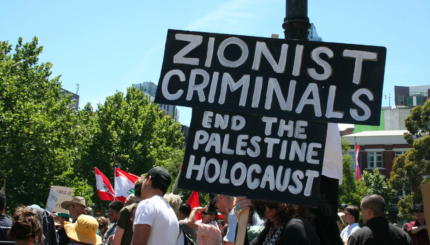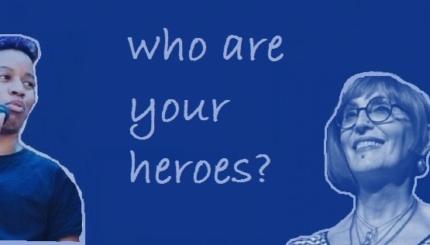When I moved to the Pacific Northwest from Brooklyn, New York almost three years ago, I started receiving emails from Jewish folks who wanted to meet with me. Finding Jewish community in a city that prides itself on a cool lack of religion and a focus on liberalism and spirituality, I was stoked to receive these emails. Yet as I clicked the messages open, I felt disappointed. Most went a bit like this: “Hey Erika, so-and-so told me that you were moving to Seattle and that I should reach out. I’m a queer, anti-Zionist Jew…” Others invited me to Jewish Voice for Peace Shabbat services aimed at furthering BDS movements in the area.
As a black, lesbian, Jewish, American woman I sit at the crossroads of a variety of identities. Yet, when I show up in the world, most folks peg me as straight, and possibly Christian. I’ve worked hard through my work with organizations like the Jewish Multiracial Network and through my writing to remind folks that Jews of Color have always been a part of the Jewish narrative. The vast majority of Jews in the world are people who would be defined as non-white, yet to Americans, to be Jewish is to be white.
It is this association with whiteness vis-à-vis Jewishness that seems to be at the heart of the Chicago Dyke March’s recent statement defending their removal of Jewish dykes carrying Jewish Pride flags. Since I am not privy to the conversations that happened between CDM and the folks removed, I won’t make assumptions about what did and did not happen. However, the fallout has been marked. Folks in my life who are either not Jewish or who have never talked about Judaism had vocal opinions, and anti-Israel posts showed up on the social media platforms of people I’ve had around my Shabbat table. Black friends of mine and black queer folks seemed to agree with CDM’s choice of citing Black Lives Matter and equating Zionism with white-supremacist ideology.
READ: I’m A Lesbian But the Chicago Dyke March Doesn’t Speak for Me
The concept of Israel is one of nuance. The state of Israel is complex, layered, problematic and divisive. Being in Israel, in my experience, elicits a balance of emotions that I’ve never quite been able to articulate. While I am swept away by the beauty and majesty that is the Old City, the historical complexities of the land are just as real as the bullet and cannonball impressions on Jaffa Gate. It has been my experience that sitting with the complexity and nuance makes for a better understanding of something that can’t be fully understood.
READ: Intersectionality and the Limits of Ideology
Do I think Israel should exist? Yes. Do I think Palestine should exist? Yes. I don’t believe that the two are mutually exclusive. When I see the Pride flag with a Jewish star, I see just that. I don’t see an Israeli flag; I don’t see “pinkwashing;” I don’t see the State of Israel. I see the Magen David, which has been a Jewish symbol since as early as the 17th century — long before the state of Israel adopted it for the flag. When that flag — a symbol that I believe represents me — was rejected by my own community, I wondered where I belong and how I can show up in queer spaces as a Jew. Since there is nuance, I understand why folks view this issue differently than I do, but hard lines and black and white don’t make for good conversation. Understanding of personal experience can only happen through dialogue. If we can’t even talk to one another, how can we move toward the acceptance and inclusion that LGBTQ+ people are fighting for every day?



